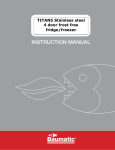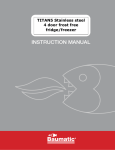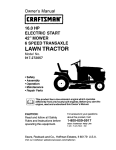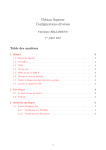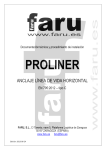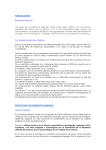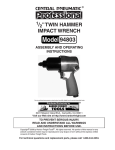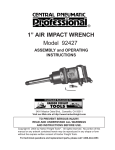Download Central Pneumatic IMPACT SET 33567 User's Manual
Transcript
® COMBO RATCHET/IMPACT SET Assembly and Operating Instructions ® 3491 Mission Oaks Blvd. / Camarillo, CA 93011 Copyright © 1997 by Harbor Freight Tools®. All rights reserved. No portion of this manual or any artwork contained herein may be reproduced in any shape or form without the express written consent of Harbor Freight Tools. For technical questions and replacement parts, please call 1-800-444-3353. REVISED 12/02 05/04 SPECIFICATIONS RATCHET WRENCH Average Air Consumption Recommended Air Pressure Air Inlet Free Speed Maximum Torque (ft. lbs.) IMPACT WRENCH Bolt Capacity Speed Air Inlet Sockets Maximum Torque (ft. lbs.) — 4 CFM 90 PSI ¼” NPT 150 RPM 45 — 1/2" 7000 RPM ¼” NPT 7/16" – 1" 230 SAVE THIS MANUAL You will need the manual for the safety warnings and cautions, assembly instructions, operating procedures, maintenance procedures, trouble shooting, parts list, and diagram. Keep your invoice with this manual. Write the invoice number on the inside of the front cover. Keep both this manual and your invoice in a safe, dry place for future reference. SAFETY WARNING & CAUTIONS WARNING: When using pneumatic equipment, basic safety precautions should always be followed to reduce the risk of personal injury and hazards due to over pressurization. READ ALL INSTRUCTIONS BEFORE USING THIS TOOL! 1. KEEP WORK AREA CLEAN. Cluttered areas invite injuries. 2. OBSERVE WORK AREA CONDITIONS. Do not use tools in damp, wet, or poorly lit locations. Don’t expose to rain. Keep work area well lit. Do not use electrically powered air compressors in the presence of flammable gases or liquids. 3. KEEP CHILDREN AWAY. Children must never be allowed in the work area. Do not let them handle machines, tools, or hoses. Keep others a safe distance from tool while tool is in operation as accidental actuation may occur, possibly causing injury. 4. STORE IDLE EQUIPMENT. When not in use, tools must be locked up in a dry location to inhibit rust. Always lock up tools and keep out of reach of children. 5. DO NOT FORCE THE TOOL. It will do the job better and more safely at the rate for which it was intended. Do not use inappropriate attachments in an attempt to exceed the tool’s capacities. For technical questions, please call 1-800-444-3353. Page #2 -- SKU: 33567 REV 12/02 REV 05/04 6. USE THE RIGHT TOOL FOR THE JOB. Do not attempt to force a small tool or attachment to do the work of a larger industrial tool. Do not use a tool for a purpose for which it was not intended. 7. DRESS PROPERLY. Do not wear loose clothing or jewelry as they can be caught in moving parts. Non-skid footwear is recommended. Wear restrictive hair covering to contain long hair. 8. USE EYE AND EAR PROTECTION. Always wear ANSI-approved chemical splash goggles when working with chemicals. Always wear ANSI-approved impact safety goggles at other times. Wear a full face shield if you are producing metal filings or wood chips. Wear an ANSI-approved dust mask or respirator when working around metal, wood, and chemical dusts and mists. When operating for extended periods of time, use approved ear protection. Safety goggles and ear protectors are available from Harbor Freight Tools. 9. DO NOT ABUSE THE POWER CORD. Do not yank compressor’s cord to disconnect it from the receptacle. Do not carry tools by the cord. 10. DO NOT OVERREACH. Keep proper footing and balance at all times. Do not reach over or across running machines. 11. MAINTAIN TOOLS WITH CARE. Keep tools sharp and clean for better and safer performance. Follow instructions for lubricating and changing accessories. Inspect compressor’s cord periodically and, if damaged, have it repaired by an authorized technician. Inspect all hoses for leaks prior to use. The handles must be kept clean, dry, and free from oil and grease at all times. 12. REMOVE ADJUSTING KEYS AND WRENCHES. Make it a habit to check that keys and adjusting wrenches are removed from the tool or machine work surface before plugging it in. 13. AVOID UNINTENTIONAL STARTING. Do not carry any tool with your finger on the trigger, whether it is connected to the compressor or not. 14. STAY ALERT. Watch what you are doing; use common sense. Do not operate any tool when you are tired. 15. CHECK DAMAGED PARTS. Before using any tool, any part that appears damaged should be carefully checked to determine that it will operate properly and perform its intended function. Check for alignment and binding of moving parts; any broken parts or mounting fixtures; and any other condition that may affect proper operation. Any part that is damaged should be properly repaired or replaced by a qualified technician. Do not use the tool if any switch does not turn on and off properly. 16. REPLACEMENT PARTS AND ACCESSORIES. When servicing, use only identical replacement parts. Use of any other parts will void the warranty. Only use accessories intended for use with this tool. Approved accessories are available from Harbor Freight Tools. 17. DO NOT OPERATE TOOL IF UNDER THE INFLUENCE OF ALCOHOL OR DRUGS. Read warning labels on prescriptions to determine if your judgment or reflexes are impaired while taking drugs. If there is any doubt, do not operate the tool. For technical questions, please call 1-800-444-3353. Page #3 -- SKU: 33567 18. DRAIN COMPRESSOR EVERY DAY. Do not allow moisture to build up inside the compressor. Do not allow compressor to sit pressurized for longer than one hour. 19. MAKE SURE ALL EQUIPMENT IS RATED TO THE APPROPRIATE CAPACITY. Make sure that the regulator is set at least 10 PSI lower than the lowest rated piece of equipment you are using. 20. DO NOT USE OXYGEN, COMBUSTIBLE GASES, OR BOTTLED GASES AS A POWER SOURCE. The tool may explode, possibly causing injury. 21. DO NOT EXCEED the recommended air pressure of 90 PSI. 22. TOOL MUST NOT HOLD PRESSURE WHEN AIR SUPPLY IS DISCONNECTED. If a wrong fitting is used, the tool can remain charged with air after disconnecting and thus will be able to cycle after the air line is disconnected possibly causing injury. 23. ALWAYS DISCONNECT AIR SUPPLY: Before making adjustments, when servicing the tool, when clearing a jam, when tool is not in use, or when moving to a different work area, as accidental actuation may occur, possibly causing injury. 24. DISCONNECT POWER. Unplug compressor when not in use. 25. OUTDOOR EXTENSIONS CORDS. When the equipment is operated outdoors, use only extension cords intended for outside use. See chart under “Extension Cords” for the proper AWG rating depending on the length of the cord(s) being used. 26. DO NOT ABUSE THE POWER CORD. Do not yank it to disconnect it from the receptacle. Do not carry tools by the cord. 27. GUARD AGAINST ELECTRIC SHOCK. Prevent body contact with grounded surfaces such as pipes, radiators, ranges, and refrigerator enclosures. For technical questions, please call 1-800-444-3353. Page #4 -- SKU: 33567 REV 12/02 GROUNDING INSTRUCTIONS If compressor has a three-prong plug 1. This machine has a three-prong plug. The third prong (round) is the ground. Plug the machine’s cord only into three-prong receptacles. Never cut off the round prong. Cutting off the ground will result in a safety hazard and void the warranty. 2. If a three-prong receptacle is not available, you may use an adapter. Extending from the male end of the adapter, you will find a ring connector or wire lead with a ring connector where the ground (round prong) would be. Remove the center screw of the outlet cover and put the screw through the ring connector and back into the hole of the outlet cover. Do not overtighten or you will crack the outlet cover. If compressor has a two-prong plug This machine has a polarized plug. One prong is wider than the other prong. This plug will fit in polarized outlet only one way. If the plug does not fit fully in the outlet reverse the plug. If it still does no fit, contact a qualified electrician to install the proper outlet. Do not attempt to modify the plug in any way. Modifying the plug will result in a safety hazard and void the warranty. For technical questions, please call 1-800-444-3353. Page #5 -- SKU: 33567 REV 12/02 UNPACKING When unpacking, check to make sure the following parts are included. All sizes listed below are approximate. If any parts are missing or broken, please call Harbor Freight Tools at the number on the cover of this manual. Item# N/A N/A N/A N/A Description 3/8" Ratchet Wrench 1/2" Impact Wrench 3/8" to 1/2" Adapter 4mm Hex Wrench Item# N/A N/A N/A Description Impact Sockets (7/16" – 1") Oil Pot Air Coupler ASSEMBLY Your Air Ratchet comes completely assembled. Air Connection for Ratchet Step 1: Remove the plastic cap from the rear of the CONNECTION HEAD (#2). Step 2: Wrap the threads of the Air Coupler with pipe thread seal tape (not included). Attach the Air Coupler to the CONNECTION HEAD. Tighten the fitting. Step 3: Your Air Ratchet is ready for use. Impact Wrench This Impact Wrench develops a maximum of 230 ft/lbs. of torque. The amount of torque can be increased or decreased using the AIR REGULATOR (#11). When the Air Regulator is completely screwed in it is at it’s lowest setting. Air pressure increases as you loosen the Air Regulator. For technical questions, please call 1-800-444-3353. Page #6 -- SKU: 33567 REV 12/02 REV 05/04 OPERATION Setup Frequent, but not excessive, lubrication is required for best performance. Oil added through the airline connection will lubricate internal parts. An automatic airline oiler is recommended but oil may be added manually before every operation or after about 1 hour of continuous use. Only a few drops of oil at a time are necessary. Too much oil will collect inside the tool and be blown out during the exhaust cycle. ONLY USE PNEUMATIC TOOL OIL. Do not use detergent oil or additives as these lubricants will cause accelerated wear to the seals in the tool. Dirt and water in the air supply are major causes of pneumatic tool wear. Use a filter/oiler for better performance and longer life. The filter must have adequate flow capacity for the specific application. Consult the manufacturer’s instructions for proper maintenance of your filter. The connector on the tool must not hold pressure when the air supply is disconnected. If the wrong fitting is used, the tool can remain charged with air after being disconnected and still be able to drive a fastener. See Figure 1 for the recommended accessories and connection order. Air Ratchet Figure 1 — Airline Oiler Assembly For technical questions, please call 1-800-444-3353. Page #7 -- SKU: 33567 REV 12/02 Air Ratchet Operation Step 1: Select the appropriate socket for your needs. Step 2: Attach the socket to the RATCHET ANVIL (#18) as shown in Figure 2. 123456 123456 123456 123456 123456 123456 123456 123456 123456 123456 Air Inlet Roll Pin (#5) Figure 2 — Attaching the Socket Step 3: Set the compressor’s pressure regulator to 90 PSI. Do not set the compressor’s outlet regulator over 90 PSI. Step 4: Connect the Air Ratchet to the air compressor’s hose. If leaking is detected, disconnect the air hose and repair before use. For technical questions, please call 1-800-444-3353. Page #8 -- SKU: 33567 REV 12/02 Loosening Step 1: Check the direction of the drive by pressing the TRIGGER (#4) as shown in Figure 3. 1234567 1234567 1234567 123456 1234567 123456 1234567 123456 123456 123456 123456 Figure 3 — Operating the Air Ratchet Step 2: If the Air Ratchet is going counterclockwise (the correct direction to loosen), then proceed to Step 4. Step 3: To change the direction of the drive to loosen, turn the dial marked “R-F” clockwise as shown in Figure 4. Figure 4 — Changing Direction of the Drive Step 4: Place the socket over the nut to loosen. Step 5: Grip the Air Ratchet firmly. Press the TRIGGER to begin loosening. Step 6: If the Air Ratchet cannot loosen the nut, DO NOT raise the outlet pressure of the air compressor. Do not continue attempts to loosen with the Air Ratchet. Use appropriate tools and methods to loosen the nut. Step 7: When the nut is removed, stop the Air Ratchet by releasing the TRIGGER and remove the Air Ratchet. Remove the nut from the socket if needed. For technical questions, please call 1-800-444-3353. Page #9 -- SKU: 33567 REV 12/02 Tightening Step 1: Check the direction of the drive by pressing the TRIGGER (#4) as shown in Figure 3. Step 2: If the Air Ratchet is going clockwise (the correct direction to tighten), then proceed to Step 4. Step 3: To change the direction of the drive in order to tighten, turn the dial marked “R-F” counterclockwise as shown in Figure 5 Figure 5 — Changing the Direction of the Drive Step 4: Thread the nut on as far as you can by hand. Step 5: Place the socket on the nut. To begin tightening the nut, press the TRIGGER. Step 6: If the Air Ratchet stalls while tightening, do not continue attempts to tighten the nut with the Air Ratchet. DO NOT raise the outlet pressure of the air compressor. Use the appropriate tools and methods to tighten the nut. Step 7: When the nut has been tightened, remove the Air Ratchet and socket. Step 8: If available, check the recommended torque specification for the nut. You should use a torque wrench to torque the nut after using the Air Ratchet. For technical questions, please call 1-800-444-3353. Page #10 -- SKU: 33567 REV 12/02 MAINTENANCE Your Air Ratchet is best operated with an Airline Oiler. If you are using the Air Tool without an Airline Oiler, follow the steps below. Step 1: Disconnect the Air Ratchet from the air hose. Step 2: Apply a few drops of PNEUMATIC TOOL OIL through the air inlet before each use, or every hour if used continuously. CAUTION Do not use detergent oil or additives as these lubricants will cause accelerated wear to the seals in the tool. Step 3: Apply a few drops of oil to the VALVE (#6), location shown in Figure 6. Work the TRIGGER a few times to lubricate. Air Inlet 123456 123456 123456 123456 123456 123456 123456 123456 123456 123456 Valve (#6) (underneath trigger) Figure 6 — Lubrication Points For technical questions, please call 1-800-444-3353. Page #11 -- SKU: 33567 REV 12/02 REV 05/04 Impact Wrench Operation Step 1: Set the compressor’s pressure regulator to a maximum of 90 PSI. 90 PSI is satisfactory without harming this tool. Step 2: Remove the plastic cap from the rear of the HOSE ADAPTER (#10). Step 3: Wrap the threads of the Air Coupler with pipe thread seal tape (not included). Attach the Air Coupler to the HOSE ADAPTER. Tighten the fitting. Step 4: Determine the socket size necessary for the job you need to do. Attach the appropriate 1/2” drive socket to the Impact Wrench as shown in Figure 7. Figure 7 — Attaching the Air Coupler and Socket Step 5: Connect the Impact Wrench to the air compressor’s hose. If leaking is detected, disconnect the air hose and repair before use. For technical questions, please call 1-800-444-3353. Page #12 -- SKU: 33567 REV 12/02 REV 05/04 Step 6: Select the power setting for Loosening by pushing in and turning the AIR REGULATOR (#11) located on the bottom of the CAUTION Impact Wrench as shown in Figure 8. Use the Setting Appropriate for the When the AirRegulator is completely Job. Do Not Set the Power Setting screwed in it is at it’s lowest setting. Higher Than Needed. Damage to Air pressure increases as you push in Parts Could Result. and turn the Air Regulator. Figure 8 — Adjusting the Reverse Power Setting Step 7: Select the direction of the Wrench (forward or reverse) by pushing the REVERSE VALVE (#3) located on the handle of the Impact Wrench as shown in Figure 9. Figure 9 — Selecting Reverse Direction For technical questions, please call 1-800-444-3353. Page #13 -- SKU: 33567 REV 12/02 REV 05/04 Step 8: Press the TRIGGER (#4) to test the Impact Wrench. The Impact Wrench should spin freely as shown if Figure 10. Figure 10 — Pressing Trigger Loosening Step 1: Verify that the power level is correct for your needs and that the REVERSE VALVE (#3) has been shifted (pressed) completely to the right. If not, refer to Steps 6 through 7 under Impact Wrench Operation before proceeding. Step 2: Place your work in as clear a location as possible. Make sure the air hose will reach as far as needed without stressing any connections. Step 3: With the correct socket attached to the Impact Wrench, slide the socket over the nut or bolt. Step 4: Grip the Impact Wrench with both hands, especially with higher power settings. Make sure you are in a stable position and spread your feet shoulder-width apart. Step 5: Press the TRIGGER (#4) to loosen the bolt. Step 6: If the bolt will not loosen, and you are on a low power setting for Loosening, try increasing the power setting and attempt again. WARNING The Impact Wrench May Kick Back During Operation. If This Happens, Release the TRIGGER IMMEDIATELY! Step 7: If the bolt will not loosen with the Impact Wrench on a higher power setting, do not repeat attempts to loosen. You may snap the bolt or strip the threads of the stud or nut. Try another method to loosen the bolt or nut. For technical questions, please call 1-800-444-3353. Page #14 -- SKU: 33567 REV 12/02 REV 05/04 Tightening Step 1: Verify that the power level is correct for your needs and that the REVERSE VALVE (#3) has been shifted (pressed) completely to the left. If not, refer to Steps 6 through 7 under Impact Wrench Operation before proceeding. Step 2: Place your work in as clear a location as possible. Make sure the air hose will reach as far as needed without stressing any connections. Step 3: Thread the nut or bolt on as far as possible by hand. This is to prevent cross-threading. Step 4: If you have torque specs for the nut or bolt you are working on, refer to them. If a low torque setting is given, it is recommended that you use a socket wrench or a manual torque wrench to tighten as the Impact Wrench may provide too much torque, even in the lowest power setting. Step 5: Place the socket onto the nut or bolt. Step 6: Grip the Impact Wrench with both hands, especially with higher power settings. Make sure you are in a stable position and spread your feet shoulder-width apart. Step 7: Press the TRIGGER to tighten the bolt. Step 8: When the bolt is tight, release the TRIGGER. DO NOT OVER TIGHTEN! MAINTENANCE There are no user-serviceable parts in your Impact Wrench. Attempts to repair or make adjustments on your tool are prohibited and will VOID your warranty. Refer to OPERATIONS Setup for information on maintaining your tool. Wipe down your tool after every use and store it in a drawer or other safe place. WARRANTY Air Tools covered under Central Pneumatic 1 year warranty. Sockets covered under Pittsburgh Limited Lifetime warranty. For technical questions, please call 1-800-444-3353. Page #15 -- SKU: 33567 REV 12/02 REV 04/04 PARTS LIST – RATCHET WRENCH Item# 1 2 4 5 6 7 8 9 10 11 12 13 14 15 16 17 18 19 20 21 22 Parts No. HY150-01 HY150-02 HY150-04 HY150-05 HY150-06 HY130-18 HY150-08 HY150-09 HY160-12 HY150-11 HY150-12 HY150-13 HY150-14 HY150-15 HY150-16 HY150-17 HY150-18 HY150-19 HY150-20 NY150-21 HY150-22 Description Housing Connection Head Trigger Roll Pin Valve O-Ring Spring Valve Plug O-Ring Washer Thread Ring Gear Clamp Nut Idler Gear Idler Gear Pin Idler Gear Plate Crank Shaft Ratchet Anvil Ratchet Housing Spacer Needle Bearing Drive Bushing Item# 23 24 25 26 27 28 29 30 31 32 33 34 35 36 37 38 39 40 41 42 Parts No. HY150-23 HY150-24 HY150-25 HY150-26 HY150-27 HY150-28 HY150-29 HY150-30 HY150-31 HY150-32 HY150-33 HY150-34 HY150-35 HY150-36 HY150-37 HY150-38 HY150-39 HY150-40 HY150-41 HY150-42 Description Ratchet Yoke Cylinder Rotor Rotor Blade Front Plate Front Bearing Rear Plate Rear Bearing Cylinder Pin Thrust Washer (3/8") Thrust Washer (1/2") Spring Lock Pin Ratchet Pawl Pin Reverse Button Retainer Ring Spring Steel Ball Washer For technical questions, please call 1-800-444-3353. Page #16 -- SKU: 33567 REV 12/02 Exploded View Diagram - Ratchet Wrench For technical questions, please call 1-800-444-3353. Page #17 -- SKU: 33567 REV 12/02 PARTS LIST – AIR IMPACT WRENCH Item# 1 2 3 4 5 6 7 8 9 10 11 12 13 14 15 16 17 18 19 20 21 22 Parts No. 16001 16002 16003 16004 16005 16006 16007 16008 16009 16010 16011 16012 16013 16014 16015 16016 16017 16018 16019 16020 16021 16022 Description Housing Valve Sleeve Reverse Valve Trigger Spring Pin Valve Stem Bushing Steel Ball Spring Hose Adapter Air Regulator O-Ring Set Screw Spring Anvil Bushing Anvil Collar O-Ring Anvil Hammer Cage Hammer Pin Hammer Dog Drive Cam Item# 23 24 25 26 27 28 29 30 31 32 33 34 35 36 37 38 39 40 41 42 43 Parts No. 16023 16024 16025 16026 16027 16028 16029 16030 16031 16032 16059 16033 16035 16036 16037 16038 16039 16040 16041 16042 16043 Description Ball Bearing (X2) Cylinder Rotor Rotor Blade (X6) Front End Plate Spring Pin Rear End Plate Spring Pin Oil Seal Rear Gasket O-Ring Rear Cover Cap Screw (X4) Pin Spring Set Screw Exhaust Deflector Tapping Screw (X2) Set Screw Protecting Rubber Rubber For technical questions, please call 1-800-444-3353. Page #18 -- SKU: 33567 REV 12/02 Exploded View Diagram -- Air Impact Wrench For technical questions, please call 1-800-444-3353. Page #19 -- SKU: 33567 REV 12/02



















